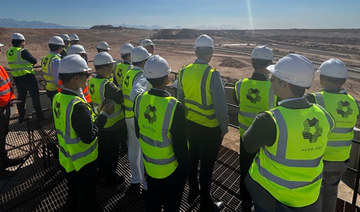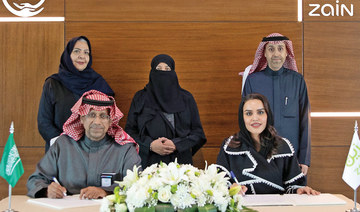LONDON: A fashion industry is taking shape in the MENA region that could create jobs for up to 20 million women, the Arab Fashion Council has said.
The organization, which aims to unite 22 Arab countries under one umbrella, is laying the framework for a style sector stretching from North Africa to the Gulf.
Countries will be divided into three clusters to harness the strengths of local economies and create a sustainable fashion infrastructure that reaches across the region, said Jacob Abrian, founder and chief executive of the Arab Fashion Council. “This way we are connected in terms of creative economy — every country will be pioneering its own expertise.”
North Africa will provide the raw materials and textiles, building on an established manufacturing industry, while the factories of the Levant will be used for finishing and assembling the products. Retail will be concentrated in the Gulf, where cities such as Dubai and Abu Dhabi attract shoppers from all over the world. “By doing this we estimate having 20 million women as part of the system from all over the Arab world,” Abrian said.
This is an opportunity to “create a completely new economy,” he said.
On Monday, Princess Noura Bint Faisal Al-Saud, honorary president of the Arab Fashion Council, which recently announced plans to open a regional office in the Kingdom, said Saudi Arabia would host its first Arab Fashion Week in Riyadh this March.
Reading a letter from the General Entertainment Authority in Saudi Arabia, she said: “Saudi Arabia’s artistic community has been growing in size and in confidence for a number of years and the General Entertainment Authority believes that such an event will allow a proper platform to showcase their fashion and arts talents as the vehicle for a comprehensive range of entertainment options in Saudi Arabia.
“The General Entertainment Authority is proud to support an event that seeks to bring people together in a mutual appreciation of the power of fashion and art.”
Arwa Al-Banawi, a Saudi designer who regularly exhibits at Paris Fashion Week, said the Kingdom has been a regional fashion hub “for years but never on a global level.”
“There’s so much talent and so many buyers and beautiful boutiques in Saudi — we have the right people that can actually make this happen and make it a hub,” Al-Banawi said.
Saudi designers are an established presence on the runways of London, Paris and Milan but this is the first time the catwalks will come to the Kingdom for Arab Fashion Week.
The inaugural Saudi Arab Fashion week will take place in Riyadh next month, but preparations have been underway for some time to get major brands on board and secure a high-profile guest list.
Princess Noura told Arab News that before the news was announced, organizers had already struck a deal with Harvey Nichols Riyadh to support the trunk shows and begun compiling a star-studded guest list, featuring established names from the Arab fashion community and international heavyweights such as Roberto Cavalli.
“We’re opening doors for all international markets to come to Saudi Arabia … welcoming any brand, whether it’s high-end couture, ready-to-wear ... local or international,” she said, describing the emergence of “a more diversified market.”
“This event is just the beginning; it’s a marketing tool to say this is Saudi Arabia, we’re open, you’re welcome to come.”
The Arab Fashion Council recently announced a new partnership with the British Fashion Council to support its regional growth strategy while providing a gateway for UK fashion brands to the region. British brands, including Burberry, Erdem and Ralph & Russo, are popular among style-savvy Saudis but the alliance will also help fast-track some of the emerging talent that London is famous for.
Caroline Rush, chief executive of the British Fashion Council, said in a statement: “We are delighted to be working with AFC who represent an incredibly important market for British fashion designers. We are looking forward to developing a strategy for brands and businesses looking to expand into the Arabic countries through this collaboration with AFC, who are experts in this field. The British Fashion Council’s role in this partnership is to share their expertise in setting up infrastructure to nurture and discover Arabic design talent of the future.”
MENA countries are keen to tap into a global fashion industry worth an estimated $3 trillion, said Layla Issa Abuzaid, Saudi Arabia country director at the Arab Fashion Council, adding that the BFC’s support would help strengthen the fashion sector in Saudi Arabia, which is among the fastest-growing in the world: “As an economy, our fashion sector in Saudi Arabia is growing at a rate of 73 percent a year.”
She emphasized the scope of the Saudi fashion industry to support other sectors such as tourism, hospitality, travel and trade. “For all international brands it is a great market to explore.”
“Fashion has always been important to Arabs and our designers are definitely benefiting from the beginning of a proper fashion infrastructure,” said Marriam Mossalli, a well-known Saudi fashion editor and founder of luxury consulting firm Niche Arabia
In a previous interview with Arab News, she said: “We are seeing the creative sector in Saudi grow exponentially.”
“With a population that has 70 percent under the age of 30, we are about to see an influx of of new careers, and most importantly new creative industries.”
“There is an ever-growing appreciation in Saudi society for fashion,” said Mohammed Khoja, a Saudi designer. “Fashion, as an art form, is very far reaching and due to current efforts and investments in the industry and in manufacturing in the Kingdom, I believe that we’ll begin to see the fashion infrastructure grow in 2018.”
Alia Khan, chairwoman of the Islamic Fashion and Design Council, which is also planning to open an office in the Kingdom, believes the Saudi fashion industry will become a key driver for the local economy. “Saudi Arabia is a very important market and I don’t think we’ve even begun to understand the level of talent that comes from the Kingdom.”
Discussing the opportunities created by recent reforms, she said: “I think now we’re going to start seeing a little bit more of the vast talent and range of skill they have.”
“Saudi Arabia will be a big driver in style … there’s going to be a strong demand for Saudi-based fashion.
“A lot of people will be watching
this space.”
MENA fashion industry could create jobs for 20 million women
MENA fashion industry could create jobs for 20 million women

Saudi tourism fund signs MoU for development of resorts in Kingdom
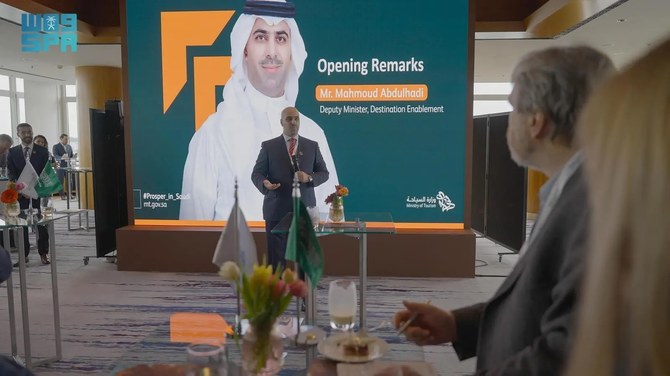
RIYADH: Saudi Arabia is set to witness the development of new luxury resorts as the Tourism Development Fund signed a memorandum of understanding with Karisma Hotels and Resorts International, the Saudi Press Agency reported.
The signing took place at the International Hospitality Investment Forum in Berlin on Wednesday. The MoU seeks to explore opportunities for developing resorts and enhancing new areas of the tourism and hospitality sector in the Kingdom.
The agreement outlines a roadmap to determining a methodology for investing and providing financial and non-financial support to a vibrant ecosystem of investors, clients, and partners.
“The Tourism Development Fund is unlocking a great potential with Karisma Hotels and Resorts as we join forces to explore the feasibility of funding and supportive innovative projects that will significantly contribute to the growth of the tourism sector,” SPA quoted TDF CEO Qusai Al-Fakhri as saying.
The fund aims to connect the world with opportunities in the Kingdom’s fast-growing tourism sector. It offers financial and non-financial support to international and local investors.
“We are proud to announce the company’s significant entrance into Saudi Arabia with multiple hotel developments throughout the Kingdom in collaboration with our partners and local developers. Karisma will introduce first-of-its-kind experiential leisure hotels in partnership with worldwide acclaimed brands, bringing a new offering of leisure vacations to the Kingdom,” Esteban Velasquez, CEO of Karisma Hotels and Resorts, said.
Saudi Arabia’s tourism sector has revised its 2030 target to 150 million visitors, up from the initial 100 million.
The tourism sector has become important to the national economy, as spending on tourism by domestic and international tourists exceeded SR250 billion ($66.7 billion) in 2023. The sector is set to contribute 10 percent to the non-oil gross domestic product and create 1 million job opportunities by 2030. This spending represented more than 4 percent of the Kingdom’s GDP and 7 percent of the non-oil GDP, highlighting the significance of the tourism sector to the Kingdom’s economy.
During a panel discussion, Mahmoud Abdulhadi, deputy minister of investment attraction, underscored the Kingdom’s potential opportunities for both international and local businesses to invest in the tourism industry.
He noted that the Hospitality Investment Enablers initiative, announced by the Ministry of Tourism within the Investment Enablers Program, is in line with Vision 2030's strategic goals
The top official said the initiative aims to increase and diversify tourism offerings, enhance the capacity of tourism hospitality facilities in tourist destinations, and attract private investments in the hospitality sector.
Closing Bell: TASI loses 34.45 points to close at 12,465
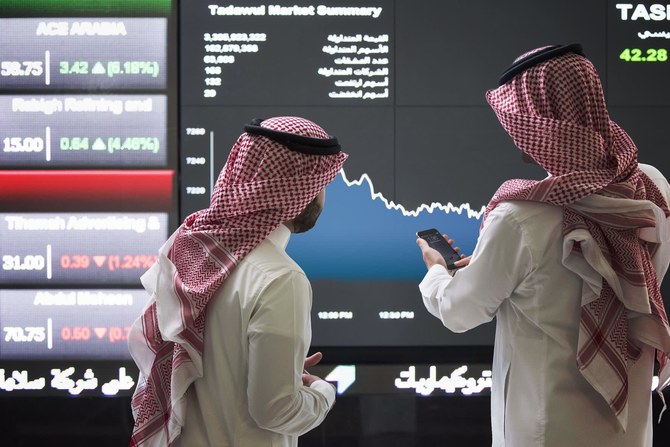
RIYADH: Saudi Arabia’s Tadawul All Share Index closed at 12,465.98 points on Wednesday, dipping 34.45 points or 0.28 percent.
The parallel market, Nomu, gained 92.53 points or 0.35 percent to close at 26,401.91.
Meanwhile, the MSCI Tadawul 30 Index also slightly declined 9.29 points or 0.59 percent to conclude at 1,569.13.
The main index posted a trading value of SR9.5 billion ($2.55 billion), with 96 stocks advancing and 131 declining.
Ash-Sharqiyah Development Co. was the top performer on TASI as its share price surged 9.95 percent to SR21.44. Batic Investments and Logistics Co. followed with its share pricing jumping 9.27 percent to close at SR2.83.
Saudi Ground Services Co. also performed well, climbing 9.09 percent to SR58.80. The Mediterranean and Gulf Insurance and Reinsurance Co. and Almunajem Foods Co. increased 8.53 and 6.32 percent to SR28 and SR117.80, respectively.
Conversely, Fawaz Abdulaziz Alhokair Co. recorded the most significant dip, declining 5.16 percent to SR11.40.
Astra Industrial Group and Etihad Etisalat Co. also experienced setbacks, with their shares dropping to SR175.40 and SR51.39, reflecting declines of 3.73 and 3.39 percent, respectively.
Saudi Chemical Co. and Saudi Real Estate Co. also reported significant losses of 3.08 percent and 2.88 percent to SR7.87 and SR22.22, respectively.
Nomu’s top performer was Future Care Trading Co., which saw a 10.68 percent jump to SR9.64.
Ladun Investment Co. and Mayar Holding Co. also recorded notable gains, with their shares closing at SR5.63 and SR4.10, marking an increase of 9.96 and 7.89 percent, respectively.
Lana Medical Co. and Al-Modawat Specialized Medical Co. also fared well, as their share price increased by 7.25 and 6.92 percent, closing at SR42.90 and SR151.40.
On Nomu, Alqemam for Computer Systems Co. was the worst performer, declining by 9.72 percent to SR90.10. Other underperformers included Saudi Parts Center Co. and Clean Life Co., whose share prices dropped 6.10 percent and 5.71 percent to SR60.0 and SR94.20, respectively.
Chinese businesses shown NEOM opportunities as ‘Discover’ tour hits Beijing, Shanghai
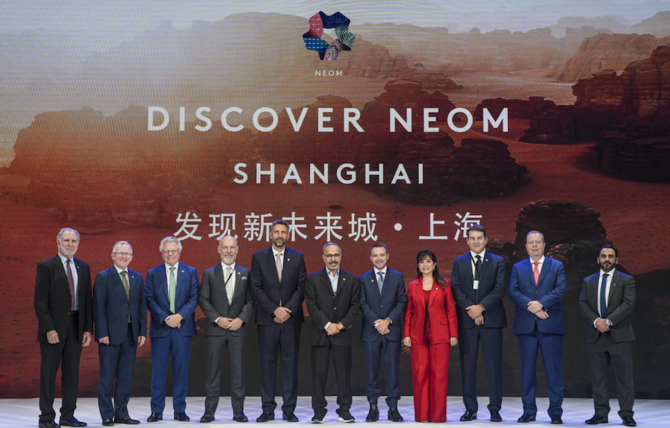
RIYADH: Opportunities for Chinese companies to engage with and invest in NEOM have been showcased in Beijing and Shanghai, attracting significant interest from several companies.
The giga-project kicked off the Chinese leg of its global “Discover NEOM” tour in the capital on April 15, followed by a visit to the country’s biggest city on April 17, attracting a cumulation of over 500 business and industry leaders.
Organized in partnership with the China Council for the Promotion of International Trade Beijing and CCPIT Shanghai, the events featured presentations by NEOM’s leadership team that highlighted on-the-ground progress and milestones, as well as detailed overviews of the initiative’s diverse economic sectors.
Numerous opportunities for Chinese companies to engage and invest in the advanced urban and economic zone were showcased during these gatherings, eliciting significant interest. Many companies expressed enthusiasm and discussed concrete next steps with NEOM’s leadership, according to a release.
“We are grateful to CCPIT Beijing and CCPIT Shanghai for supporting our visit to China and for the opportunity to present NEOM’s vision,” Nadhmi Al-Nasr, CEO of NEOM, said.
“To date, NEOM has already engaged with over 15 major Chinese businesses and invested in a number of Chinese startups to support the growth and diversification of NEOM. Collaboration with China will continue to play a vital role in the development of NEOM, and we look forward to strengthening our engagement with the country’s business community,” he added.
Over 100 Chinese building companies participated in the event’s construction-focused forum, which presented many collaboration opportunities.
Furthermore, the private showcase, “Discover NEOM: A New Future by Design,” was a highlight of the events.
It offered guests an immersive experience exploring NEOM’s developments. These included THE LINE, a 170-km-long city designed as the future of urban living; Oxagon, which is reshaping the traditional industrial model; Trojena, NEOM’s mountain resort; and Sindalah, a luxury island destination in the Red Sea set to open later this year.
“Both Beijing and NEOM are accelerating the development of new modes of productivity, deepening comprehensive reforms, promoting scientific and technological innovation, and working to ensure the protection of our environment,” Guo Huaigang, chairman of CCPIT Beijing, said.
“We look forward to the role our cooperation can have in Beijing’s future prosperity,” he added.
Expressing Shanghai’s interest in fostering its relationship with Saudi Arabia, Zhao Zhuping, deputy secretary general of the Shanghai Municipal Government, stated that the entity looks forward to deepening mutually beneficial engagement with NEOM.
“Discover NEOM China” marks the latest installment of NEOM’s global roadshow, following engagements in major international cities such as Seoul, Tokyo, and Singapore, as well as New York, Boston, and Miami.
Paris, Berlin, and London have also been visited by the expedition.
Saudi crude production hits 7-month high in February

- The Kingdom’s crude exports rose to 6.32 million bpd or 0.32 percent: JODI data
RIYADH: Saudi Arabia’s crude production reached a seven-month high of 9.01 million barrels per day in February, data from the Joint Organizations Data Initiative showed.
This represented a rise of 55,000 bpd or 0.61 percent compared to the previous month.
Furthermore, the data indicated that the Kingdom’s crude exports rose to 6.32 million bpd, reflecting a monthly increase of 0.32 percent.
In early April, the Organization of the Petroleum Exporting Countries and its allies, known as OPEC+, chose to keep their existing output policy unchanged as oil prices hit a five-month high.
Led by Saudi Arabia and Russia, OPEC+ extended voluntary output cuts of 2.2 million bpd until June to bolster the market. The decision was reached during the 53rd meeting of the Joint Ministerial Monitoring Committee on April 3.
Oil prices surged due to supply constraints, attacks on Russian energy infrastructure, and conflicts in the Middle East, with Brent crude exceeding $89 a barrel.
This extension of cuts, alongside voluntary reductions announced in April 2023, including 500,000 bpd cuts from both Saudi Arabia and Russia, now extends through December of this year.
As a result of this decision, despite the monthly increase, crude output remains approximately 14 percent lower than the levels observed during the same month last year.
The next JMMC meeting is scheduled for June 1.
Refinery output
Meanwhile, refinery crude output, representing the processed volume of crude oil yielding gasoline, diesel, jet fuel, and heating oil, surged to a five-month high. It increased by 10 percent compared to the previous month, reaching 2.68 million bpd, according to JODI data. This also marked a 10 percent increase from the 2.44 million bpd recorded during the same period last year.
As one of the world’s leading oil producers, Saudi Arabia plays a crucial role in supplying these refined products to meet global energy demands.
In February, diesel, constituting 38 percent of the total output, declined by 7 percent to 1.02 million bpd, with its percentage share decreasing from 45 percent in January. Motor aviation or jet fuel maintained a 22 percent share, experiencing an 11 percent increase to 597,000 bpd. Meanwhile, fuel oil, making up 17 percent of the total refinery output, saw a slight uptick of 0.22 percent, totaling 455,000 bpd.
Conversely, refinery output exports surged to a 10-month high, reaching 1.39 million bpd, a 12 percent monthly increase. The most significant rise was observed in motor and aviation oil, up by 45 percent to 275,000 bpd. Fuel oil exports followed with a 38 percent increase to 219,000 bpd, while diesel oil saw a 13 percent rise to 629,000 bpd.
In February, 62 percent of refinery diesel oil output was exported, marking the highest percentage in eight months. Fuel oil and motor and aviation gasoline followed suit with export percentages of 48 percent and 46 percent, respectively.
Direct crude usage
Saudi Arabia’s direct burn of crude oil, involving the utilization of oil without substantial refining processes, experienced an increase of 52,000 bpd in February, representing a 17 percent rise compared to the preceding month. The total direct burn for the month amounted to 360,000 bpd.
The Ministry of Energy aims to enhance the contributions of natural gas and renewable sources as part of the Kingdom’s goal to achieve an optimal, highly efficient, and cost-effective energy mix.
This involves replacing liquid fuel with natural gas and integrating renewables to constitute approximately 50 percent of the electricity production energy mix by 2030.
Zain KSA introduces first 100% Saudi-made fleet tracking solution for businesses
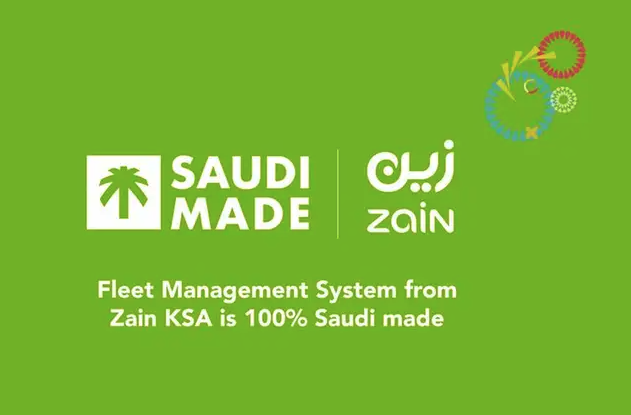
RIYADH: Saudi telecom provider Zain KSA has become the first operator in the Kingdom to offer a 100 percent locally made fleet tracking system for businesses.
The new system is expected to empower businesses in Saudi Arabia to make informed decisions through comprehensive reports generated from precise data collection.
The launch of the system, entirely made in the Kingdom for the business sector, integrates cutting-edge tracking devices that are locally designed, manufactured, and assembled under the country’s “Saudi Made” program, the company said in a statement.
The telecom company further explained that the monitoring solution is a comprehensive cloud-based platform, providing businesses of all sizes with tools to optimize logistics operations, enhance travel routes, and minimize fuel consumption. This, in turn, reduces carbon emissions, preserves the environment, and fosters sustainability.
Saad bin Abdulrahman Al-Sadhan, chief business and wholesale officer at Zain KSA, said: “We are proud to be the first telecom and digital services provider to offer an integrated solution designed and developed in the Kingdom, aligning with our sustainability strategy of supporting local content.”
He added that their achievement aligns with the aspirations of the country’s leadership and Vision 2030 in enhancing the digital economy and localizing technology.
He also emphasized his company’s commitment to building an integrated technological ecosystem aiming at leveraging digitization and automation to serve and empower the productive, service, and logistical sectors across the Kingdom.
The executive further said that their fleet management method is a direct result of this commitment, and they take immense pride in being at the forefront of companies providing 100 percent national digital solutions.
The firm said in its release that by offering real-time GPS tracking, its system enhances road safety and security across the transportation and logistics sectors, empowering decision-makers with crucial insights through comprehensive reports based on accurate data.
It added that the system allows for informed decisions that boost operational efficiency and save costs.




